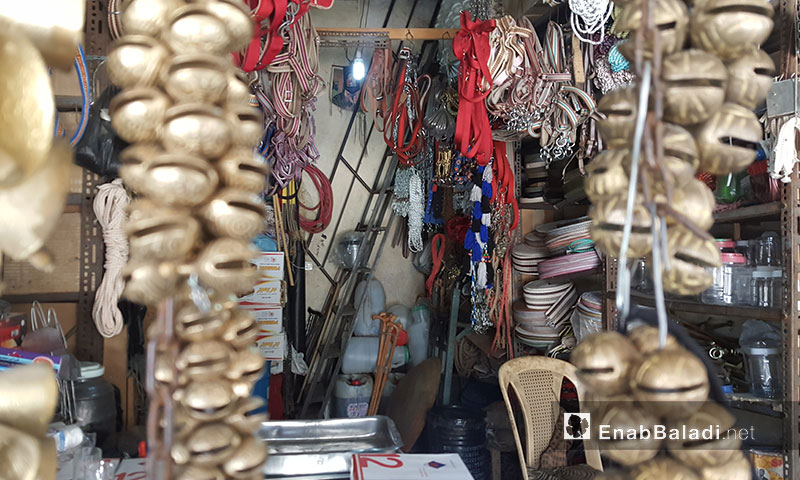



Enab Baladi – Qamishli
The Syrian Regime and its security services in Syria have been dubbed for their multilateral corruption that transcends political to reach economic corruption, and by means of which they controlled all the Syrian territories’ resources within their geographical borders, especially the economic resources.
However, the process that took place in the city of Qamishli in the Hasakah province differed radically from the usual method, for the regime has extended its economic control to reach the Ezra market, known in the city as the Jewish market, by redirecting all the shops rent money to its financial treasure box, as merchants from within the market who refused to reveal their real names have confirmed.
The market was founded in 1927 by the Jewish Ezra and was famous for selling spices and everything related to alternative medicine. It was named after the Jews who fled from Turkey to Qamishli in 1915 during the “Armenian Massacres”.
It has been owned by the so-called “Association for the Protection of Jewish Property”, which currently exists in the city of Qamishli, and which claims that it collects rent money and sends it to the accounts of former Jew inhabitants of the city to Europe and Tel Aviv.
In addition to the city of Qamishli, the Jews settled in the villages of Hawija, Halwa and Tel Shair. In 1938, they established a synagogue for them, in addition to dozens of important properties in the city center that are located in the ‘Jewish Neighborhood’, as it is called in the city, and that are owned by the association.
Currently, Qamishli, which is predominantly Kurdish, is under the joint control of the Regime’s Forces and Asayish Forces, which are the local “self-governing” police.
Abu Karam, who is one of market’s shopkeepers, spoke to Enab Baladi about the process through which the shop rents, in the previously mentioned market, are redirected to the benefit of the Syrian Regime, contrary to what the Association which is in charge of this operation mentioned.
“The rents are given to a special Jewish association called the Jewish Property Association, which claims that it transfers them after it collects them from the renters to the Syrian Regime in Damascus, who in turn transfers them to Jews in Europe,” says the shopkeeper.
But the issue has become totally different among merchants in the market, according to Abu Karam, for “a number of merchants in the market confirmed the circulating news that the Syrian Regime does not transfer the rent money to the Jews but keeps it in its bank accounts despite the insignificant sums.
He explained that “rents vary from place to place according to its location and its domain. For example, the shops in the gold market cost 18 thousand Syrian liras only per year, and some other shops in the spice market are at a cost of 15 thousand liras.”
Despite what the shopkeeper said, the rent is considered “cheap” compared to the economic situation in various Syrian cities “. 18 thousand liras per year cannot be an attractive financial resource for the regime to run after.”
Abu Karam pointed out that “despite the cheap rents, there is a large number of shops reaching more than 300 shops, whose rents can constitute a secondary resource for the Syrian Regime and reason enough for it to justify its authority in the area.
At the same time, merchant Talal confirmed what his fellow man Abu Karam said; he said “The Jewish Property Association controls everything in the market,” pointing out that “In old times, the rents extended to six thousand Syrian liras, and increased after the revolution to move from 15 thousand to 18 thousand.”
He explained that “the price of one shop goes up to 250 million Syrian liras, and rents that match with the price do not exist (…) Low prices prevent the merchants from revealing who takes their rents in order to maintain their status in the market and lest the prices shall increase.”
In addition to the former merchants, Enab Baladi contacted a number of others in the market, but they refused to talk because the subject was “sensitive”, and firmly avoided debating it.
Enab Baladi tried to talk to “the Jewish Property Association”, but it initially refused only to send later on a declaration denying what the merchants said.
It said “The rent money is transferred from Ezra market to Damascus (the Syrian regime), which in turn converts them to the accounts of the displaced Jews in Tel Aviv and Europe.”
It explained that “the number of shops is approximately 600, and the amount of money that is annually collected is 10 million Syrian liras.”
It pointed out that “it is forbidden to sell shops to any party, and they still belong to their Jewish owners so far.”
In response to what was said previously, a merchant from the market, who refused to be named, asked about “how some shops in the market got sold in the last few days (…), the process through which the sale takes place, and whose accounts the funds reach, as the price of each shop reaches 250 million Syrian liras?”.
He commented on the Association’s discourse “They say they are transferring money to the Jews in Tel Aviv and Europe … Why would the Jews need 15,000 Syrian liras a year, knowing that they are worth nothing for the dollar?” He said.
if you think the article contain wrong information or you have additional details Send Correction